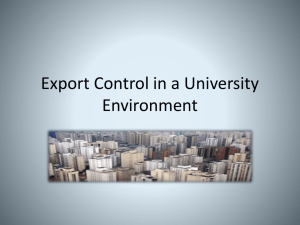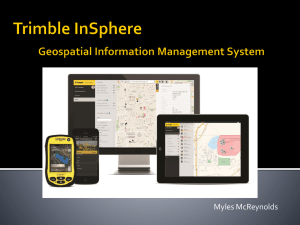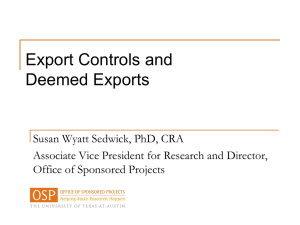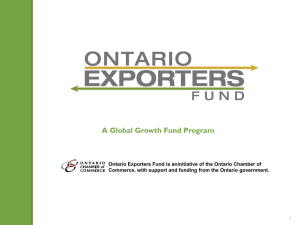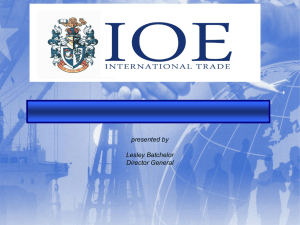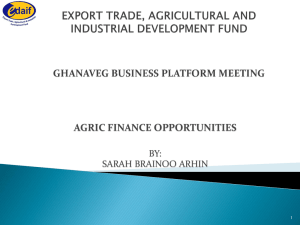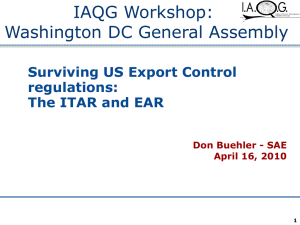What Non-Research Institutions Need to Know About Export Controls
advertisement
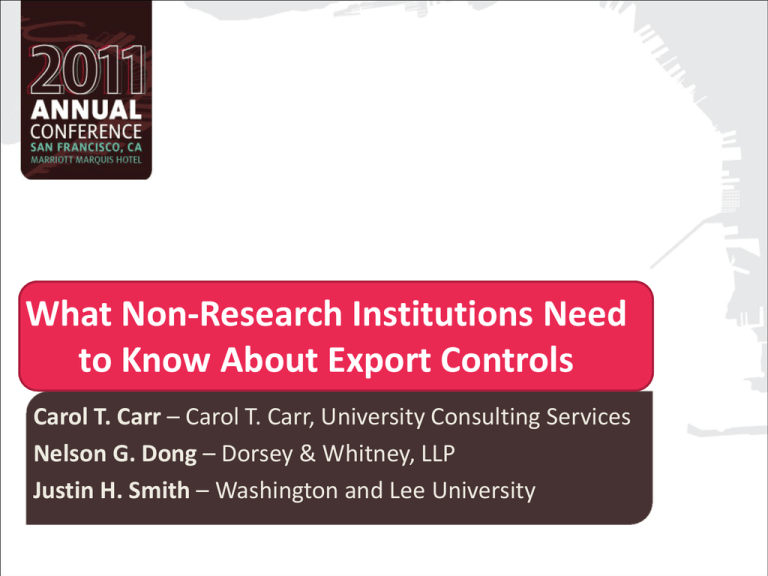
What Non-Research Institutions Need to Know About Export Controls Carol T. Carr – Carol T. Carr, University Consulting Services Nelson G. Dong – Dorsey & Whitney, LLP Justin H. Smith – Washington and Lee University THE BASICS What are Export Controls? • Generally speaking, “export controls” restrict: 1) business/monetary transactions with certain countries, entities, and individuals; and 2) dissemination of certain technology and information. • Not limited to tangible items “Deemed export” • Exclusions/Exceptions • Licenses U.S. Export Control Regimes • Embargoes Administered by: OFAC Scope: Business/monetary transactions • EAR – Export Administration Regulations Administered by: BIS Scope: “Dual use” items • ITAR – International Traffic in Arms Regulations Administered by: DDTC Scope: Defense-related items EXAMPLES OF TRIGGERS Activities That May Trigger Export Controls • Dissemination of research/expertise: – – – – To foreign nationals (within the U.S.) In a foreign country Subject to publication restrictions or prepublication review Subject to access/dissemination controls Examples: – Prepublication review of article by corporate sponsor to see whether to protect research results as “trade secret.” – Presenting at a prestigious international scientific conference where notes and recordings are not permitted. – Consulting a “third world” manufacturer of sub-micron devices. Activities That May Trigger Export Controls (cont.) • Hiring of foreign nationals whose work will involve access to technology or data subject to EAR or ITAR Examples: – Hiring foreign national whose work will involve research with biological reagents. – Hiring foreign national whose work will involve maintenance of supercomputer. Activities That May Trigger Export Controls (cont.) • Travel/shipping to/from any country Examples: – Shipping advanced telecommunications equipment to China for field research. – Carrying algorithm to Balkan penninsual on a laptop computer. Activities That May Trigger Export Controls (cont.) • Business/monetary transactions Examples: – Donation (or payment of tuition) by someone on prohibited list. – Student organization humanitarian trip to Darfur. EXCEPTIONS AND EXCLUSIONS Public Domain/Publicly Available • Information which is published and generally accessible to the public through (among other things) fundamental research. Educational Exemption • Generally, a license is not needed for classroom/lab teaching to foreign nationals in US Universities. • Students in degree programs, using controlled equipment to conduct research need to be registered for a research credit class. Fundamental Research Exclusion • Basic and applied research in science and engineering, where the resulting information is ordinarily published and shared broadly within the scientific community. • Distinguished from proprietary research and industrial development, the results of which are ordinarily restricted for proprietary reasons or national security reasons. Employment Exemption • A license is not required when sharing controlled technical data with a foreign national who – Is not a national of an embargoed country; – Is a full-time bona fide university employee; – Has a permanent address in the U.S. while employed at university; and – Is advised IN WRITING not to share covered technical data with any other foreign nationals without government approval. TMP • The export of items, technology, commercial software, and encryption code is subject to export control regulations (this includes laptops, PDAs and digital storage devices). • The TMP exception can be used for “tools of the trade” for a period of less than a year, but does not apply to any EAR satellite or space-related equipment, components, or software, or to any technology associated with high-level encryption products and cannot be used for travel to Iran, Syria, Cuba, North Korea, or Sudan. BAG • Can be used for travel outside the U.S. when you are taking PERSONAL items or technology that would normally require a license from the Department of Commerce. For example, if you plan to take your personal laptop rather than a university laptop when attending a conference or conducting research abroad, and you are taking controlled technology, software, or other information that would require a license, the BAG license exception is available. What do you do if you lose them? • Exceptions can be lost if all of the conditions for the exception are not met. Then you are subject to the export laws and regulations in the same way that commercial enterprises are. • Importance of a compliance program for your institution, including a risk assessment to identify where export control issues are arising and due diligence in managing them. (More later) AN ILLUSTRATIVE CASE STUDY OF EXPORT CONTROLS IN ACADEMIA Nelson G. Dong Head, National Security Law Group Dorsey & Whitney LLP Seattle Office NACUA Annual Meeting June 28, 2011 San Francisco, CA U.S. EXPORT CONTROL REGIMES • OFAC embargoes: Office of Foreign Assets Control in Department of the Treasury • International Traffic in Arms Regulations (ITAR): Directorate of Defense Trade Controls in Department of State • Export Administration Regulations (EAR): Bureau of Industry & Security in Department of Commerce 19 THE CASE STUDY CONTEXT • Modern University (MU) wants to update its educational model for summer term studies − MU will combine teaching scientific research methods in a “study abroad” summer term − MU will send faculty, students to a Spanishspeaking environment • MU science, language faculty decide to jointly teach 10-week program on environmental effects of the Gulf oil spill and national government responses in Mexico, Venezuela and Cuba 20 MU PROGRAM PREPARATIONS • MU faculty may send to their foreign colleagues: – Faculty and student-built ocean motion sensors – Faculty and student-created software to refine civilianlevel satellite imagery into much higher resolution images – Faculty and student-built remotely operated underwater submersibles to study marine life and undersea currents • Faculty and students will also take own PCs, equipment and instruments to help equip naval oceanographic research vessels from Mexico, Venezuela and Cuba 21 OFAC EMBARGO ISSUES • No OFAC embargo issues for Mexico or Venezuela • Cuban Transaction Regulations (CTR) in 31 CFR Part 515 affect all dealings with or travel to Cuba – Academic travel to Cuba historically difficult but new “general license” published in January 2011 – Still CTR concerns about “services” being rendered to Cuban government officials in MU program – Still may be other physical “export” aspects of MU program that bear close scrutiny under CTR • OFAC “general license” for publishing covers any joint academic papers from program 22 ITAR ISSUES • ITAR “fundamental research” exemption applies only in U.S. • If any “defense articles” or “defense services” involved, then ITAR issues raised for Mexico, Venezuela and Cuba – Mexico might get approval from DDTC – But “arms embargoes” and “policy of denial” against Venezuela, Cuba under 22 CFR Section 126.1 • MU faculty collaboration with naval oceanographic vessels from Venezuela, Cuba could be classified as “defense services” • Some MU technical preparations might also involve shipment of “defense articles” to Venezuela, Cuba – Sensors, software, submersibles 23 EAR ISSUES • Although “fundamental research” exemption in 15 CFR Part 734.8 applies only to on-campus research activities, not to any foreign programs • Many kinds of advanced lab or field research instruments may be subject to EAR export controls – Sensors, software, submersibles • Both physical export and “deemed export” issues may be raised by research collaborations by MU faculty collaborations with colleagues in Mexico, Venezuela and Cuba – Overlap with OFAC embargo issues as to Cuba – no items controlled by EAR can be exported to Cuba – High levels of scrutiny even for Mexico, Venezuela under “Country Chart” in 15 CFR Part 738 24 LEGAL EXEMPTIONS AND THE MU CASE STUDY • OFAC embargoes: April 2011 general license for Cuban academic travel; “information and informational materials” exemption and “publishing” general license for publications • ITAR: exclusion of “fundamental research” limited to such activity “in the U.S.” (i.e., not available for research conducted outside U.S. territory) • EAR: exclusion of “fundamental research” limited to such activity “in the U.S.” (i.e., not available for research conducted outside U.S. territory) 25 POLICY AND PROCEDURES Policy and Procedures • Institutional Policy • Risk Assessment and Export Management • Website with policies and procedures Policy Considerations Minimum Requirements: • Statement of Compliance with Federal laws and regulations regarding exports • Preservation of Fundamental Research Exclusion • Commitment to education and training of university personnel Export Management Oversight • Risk Assessment • Institution Overview • Identify Responsible Parties • Establish Standards of Due Diligence • Audits Export Control Website Getting the Message out to your Audience: • Faculty • University Administrative Personnel • Federal Agencies • Potential Sponsors Make it fit your institution • Identify through your risk assessment your special concerns • Engage administrators, researchers and senior administration • Keep it user friendly and timely If there’s a violation… • Investigate internally and get all the facts. • Voluntary Disclosure is in your institution’s best interest. • Consider engaging outside export counsel. PRACTICAL TIPS A Few Practical Tips • Enlist the assistance of your Business Office / Bursar and International Education Office • Ensure Business Office / Bursar and Development Office know to screen transactions against OFAC list of Specially Designated Nationals (SDNs) • Coordinate with Human Resources to ensure that export controls analysis is conducted before certification is made on USCIS Form I-129 A Few (More) Practical Tips • Add export control review to your contracts administration policy/process • Review sources of research funding • Watch out for any contract that specifically mentions export controls • Assume nothing • Utilize FAQs • Know what you don’t know, and whom to call for help OBAMA ADMINISTRATION EXPORT CONTROL REFORMS Nelson G. Dong Head, National Security Law Group Dorsey & Whitney LLP Seattle Office NACUA Annual Meeting June 28, 2011 San Francisco, CA OVERVIEW OF REFORM PROPOSALS • Obama Administration determined in April 2010 fundamental reforms of U.S. export control system were needed to move toward: – Single control list – Single primary enforcement coordination agency – Single information technology (IT) system – Single licensing agency • Reform efforts originally led by Secretaries Gates (Defense), Locke (Commerce) and Clinton (State) 37 EXECUTIVE & LEGISLATIVE CHANGES • Administration is attempting specific reforms that can be initiated immediately and implemented without legislation • Administration is already consulting with key Congressional committees to pave way for needed legislation to complete entire its reform package • Current concerns: – Two of three key Administration leaders in reform effort stepping down (Gates and Locke) – Spotty, inconsistent Congressional support for such reforms – 2012 election cycle and partisan political agendas 38 PHASE I • Control List: Refine, understand, and harmonize definitions to end jurisdiction confusion between ITAR, EAR lists; establish new independent control criteria to be used to screen items for control into new “tiered” control list structure • Licensing: Implement regulatory-based improvements to streamline licensing processes and standardize policy and processes to increase efficiencies • Enforcement: Synchronize and de-conflict enforcement by creation of an Enforcement Fusion Center among agencies • Information Technology: Determine government-wide needs and begin process to reduce confusion by creating single U.S. Government (USG) point of entry for exporters 39 PHASE II • Control List: Restructure separate USML, CCL into identical “tiered” structures; apply criteria; remove U.S. unilateral controls as appropriate; and submit proposals multilaterally to add or remove controls • Licensing: Complete transition to “mirrored” control list system and harmonize licensing to allow authorized exports within each control tier so as to reduce license requirements without detriment to national security • Enforcement: Expand outreach and compliance through primary Enforcement Fusion Center and various agencies • Information Technology: Transition toward single electronic licensing system 40 PHASE III • Control List: Merge current separate USML, CCL into a single list and implement systematic process to keep current as merged single list • Licensing: Implement single licensing agency • Enforcement: Consolidate certain enforcement activities into single Primary Enforcement Coordination Agency • Information Technology: Implement single, government-wide IT system for licensing and enforcement 41 Questions?
